-
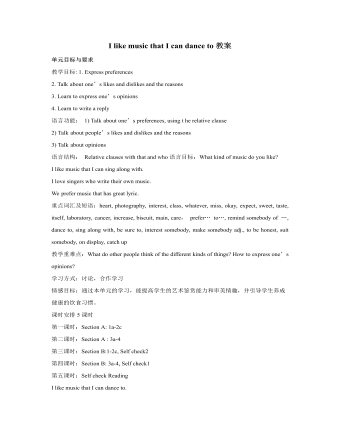
人教版新目标初中英语九年级上册I like music that I can dance to教案
教学目标: 1. Express preferences2. Talk about one’s likes and dislikes and the reasons3. Learn to express one’s opinions 4. Learn to write a reply 语言功能: 1) Talk about one’s preferences, using t he relative clause2) Talk about people’s likes and dislikes and the reasons3) Talk about opinions语言结构: Relative clauses with that and who语言目标:What kind of music do you like?I like music that I can sing along with.I love singers who write their own music.We prefer music that has great lyric.重点词汇及短语:heart, photography, interest, class, whatever, miss, okay, expect, sweet, taste, itself, laboratory, cancer, increase, biscuit, main, care, prefer… to…, remind somebody of …, dance to, sing along with, be sure to, interest somebody, make somebody adj., to be honest, suit somebody, on display, catch up教学重难点:What do other people think of the different kinds of things? How to express one’s opinions? 学习方式:讨论,合作学习情感目标:通过本单元的学习,能提高学生的艺术鉴赏能力和审美情趣,并引导学生养成健康的饮食习惯。课时安排5课时第一课时:Section A: 1a-2c第二课时:Section A : 3a-4第三课时:Section B:1-2c, Self check2第四课时:Section B: 3a-4, Self check1第五课时:Self check ReadingI like music that I can dance to.

人教版新目标初中英语九年级上册Where would you like to visit教案2篇
The First PeriodⅠ.Teaching Aims and DemandsKnowledge Objects(1) Key Vocabularytiring, educational, fascinating, thrilling, peaceful, exotic, trek, jungle, take it easy, explore, historic, site(2) Target LanguageWhere would you like to go on vacation?I’d like to trek through the jungle, because I like exciting vacations.2. Ability Objects(1)Train students to talk about places they would like to visit with the target language.(2)Train students to describe vacations with different adjectives.(3)Train students' listening skill.3. Moral Object,It′s more interesting to go on vacating somewhere instead of staying at home.Ⅱ. Teaching Key Points1. Key Vocabularytiring, educational, fascinating, thrilling, peaceful, exotic, trek, jungle, take it easy, explore, historic, site2. Target LanguageTalk about different places with the target language.Ⅲ. Teaching Difficult Points1. Describe vacations with different adjectives.2. Talk about different places with the target language.Ⅳ. Teaching Methods1. Teaching by illumination2. Teaching by doing chain drills3. Teaching by pairworkⅤ. Teaching Aids1. A tape recorder2. Some pictures of different places with famous views
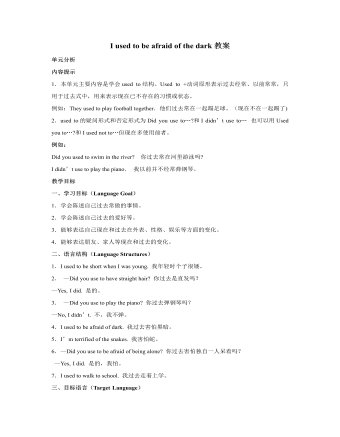
人教版新目标初中英语九年级上册I used to be afraid of the dark教案
内容提示1.本单元主要内容是学会used to结构。Used to +动词原形表示过去经常、以前常常,只用于过去式中,用来表示现在已不存在的习惯或状态。例如:They used to play football together.他们过去常在一起蹋足球。(现在不在一起踢了)2.used to的疑问形式和否定形式为Did you use to…?和I didn’t use to… 也可以用Used you to…?和I used not to…但现在多使用前者。例如:Did you used to swim in the river? 你过去常在河里游泳吗?I didn’t use to play the piano. 我以前并不经常弹钢琴。教学目标一、学习目标(Language Goal) 1.学会陈述自己过去常做的事情。2.学会陈述自己过去的爱好等。3.能够表达自己现在和过去在外表、性格、娱乐等方面的变化。4.能够表达朋友、家人等现在和过去的变化。二、语言结构(Language Structures) 1.I used to be short when I was young. 我年轻时个子很矮。 2. —Did you use to have straight hair? 你过去是直发吗?—Yes, I did. 是的。 3. —Did you use to play the piano? 你过去弹钢琴吗?—No, I didn’t. 不,我不弹。 4.I used to be afraid of dark. 我过去害怕黑暗。 5.I’m terrified of the snakes. 我害怕蛇。

人教版新目标初中英语九年级上册How do you study for a test教案2篇
内容提示本单元主要内容是学会利用verb十by/with gerund表示方式方法来讨论学习英语的策略,认识自己在学习方面的长处和不足。初步了解现在完成时的结构和用法。现在完成时由助动词have/has+动词的过去分词构成,主要表示过去发生的某一动作对现在仍有影响或造成的后果,常与already,yet,just,ever,never等副词连用。教学目标一、学习目标(Language Goal) 1. Talk about how to study . 学会讨论各种学习方法和策略。2. Find out your suitable learning methods. 找出适合自己的学习方法。 二、语言结构(Language Structures) 1. Verb + by with gerund by+动名词短语 表示“通过…途径,方法” 2. How questions have引导的特殊疑问句 三、目标语言(Target Language) 1. How do you study for tests ? 你是怎样准备考试的?Well , I study by working with my classmates. 哦,我和同学们一起学习。2. Have you ever studied with a group ? 你曾经参加过学习小组吗?Yes , I have . I’ve learned a lot that way . 是的,参加过。通过这种方式我学了许多。

人教版新目标初中英语八年级下册He said I was hard-working教案2篇
This activity introduces some new vocabulary and provide oral practice using the target language.Task 1 . Ask four students to stand in front of the class, and the teacher asks them the following questions as a reporter.1.What are you going to do when you grow up?2.What are you going to do next week?3.What are going to do after school?The students will give different answers, then ask a good student to report what they said.I am going to e a doctor.What did she say?----------She said she was going to be a doctor.I am going to have a party on Friday night.What did he say?-------He said he was going to have a party on Friday night.I am going to do my homework.What did she say ?------ She said she was going to do her homework.I am going home after school.What did she say?-----She said she was going home after school.Say In this unit we are going to learn to use words like to report what someone said.Task 2. Read the instructions. Then ask a student to read the four questions. And write the words on the Bb. Explain what soap opera is.Task 3. Ask the students to Look at the pictures, point out the TV screens in the picture. Ask one girl to read what Marcia said.What did Marcia say? She said She said she was having a surprise party for Lana on Friday night. Repeat the other pictures in the same way.Activity3. Listen and number the pictures in activity 1a.

人教版新目标初中英语七年级下册How was your weekend教案2篇
Teaching Goal:1. General aims:Talk about recent past events2. Particular aims:A. Language Focus.Talk about recent past events and think of the past events.B. Language goalsHow was….?It was …What did …do over the weekend?C. Language structures:(1). How was your weekend? I was great. Pay attention to no form.(2). What did you do over the weekend? I played soccer. We went to the beach.D. Useful words and phrases:Words: was, did, went, beach, over, project, test, wasn’t, false, number, geography, spend, week, most, mixture, their, had, little, cook, read, saw, change, everyone, sit, sat, no, anythingPhrases: did one’s homework, played soccer, cleaned my room, went to the beach, played tennis, went to the movies, on Saturday morning, over the weekend, cook … for, what about, do some reading, have a party, talk show, go shoppingE. Grammar language:Present simple past tenseRegular and irregular verbsF. Learning strategies:Tour and holidaysG. Interdiscipinary:H. Emotion and manner:Teaching time: 5 periodsTeaching procedures:Period One教学步骤、时间 教师活动 学生活动 媒体应用Step 1Free talk 3’ Ask some questions like:Who’s on duty today?What’s the weather like? Answer and talk about something.让同学们回答下列问题1. Do you like weekend? (Let some students answer)It takes them three minutes to talk about the question.2. Why do you like weekend? (let the students answer) Most of the students like the weekend此时教师用汉语问:“在周末期间问你干了什么?这句话用英语这么回答?Let the students guess.At last the teacher give them right answer3. What did you do over the weekend?(板书、学习)
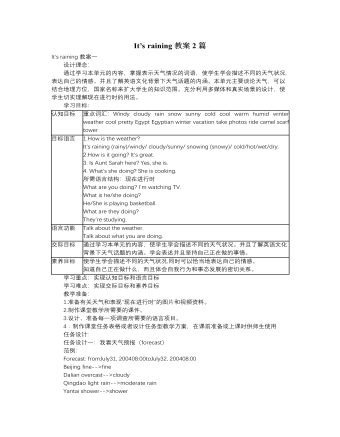
人教版新目标初中英语七年级下册It’s raining教案2篇
1 Each group choose one place to describe and what you are doing in it Choose one place, and describe what they are doing 2 Move around the room and give suggestions Talk about it and write it down 3 Ask one to show their works and act it Choose one of each group to make a report 4 Evaluate the best group and the best reporter Choose the best one Homework Ask your friends their ideal place and write about it教学反思:新课程标准中强调学生在课堂中的主体地位,在综合课中他们的主体地位就更加突出。在各个活动中给不同程度的学生不同层次的任务,让各层面的学生都有表现发挥的机会,从而产生对英语的兴趣。使用照片图片多媒体来辅助教学,效果更好。同时让了解其他国家风景,风俗的同学介绍ideal place,增加学生的背景知知识,实现跨学科交流的目的。教案点评:采用任务型教学模式,在各个活动中给不同程度的学生不同层次的任务,让各层面的学生都有表现发挥的机会,从而产生对英语的兴趣。使用照片图片多媒体来辅助教学,效果更好。让了解其他国家风景,风俗的同学介绍ideal place,增加学生的背景知识,实现跨学科交流的目的。

人教版新目标初中英语八年级下册What were you doing when the UFO arrived教案2篇
(一).知识方面: 1.培养学生能运用过去进行时来描述、谈论过去某个时间正在发生的事情或动作的意识和能力,能就过去某个时间正在发生的动作做出正确的描述。 2.培养学生的想象力和角色扮演的合作能力。 3.培养学生讲述过去发生的事情经过的能力。能正确运用一般过去时来讲述故事。 (二).技能方面: 1.本单元的语言目标是Talk about past events and tell a story(谈论过去的时间和讲述一个故事),围绕这一目标,要涉及句型: What were you doing when the UFO arrived? ----I was sitting in the barber’s chair. The barber was cutting my hair. 因此必须学习standing、studying、cleaning、sleeping、cooking、making、eating、cutting、等表示地点的词,以便为上述句型提供语言材料。2.学习过去进行时的有关知识。Was/were+现在分词,是该时态的表达式。 3.在学习过程中,要区分The boy was walking down the street when the UFO landed.和While the boy was walking down the street, the UFO landed.这两种由when和while引导的状语从句的句型结构。注意它们的不同。
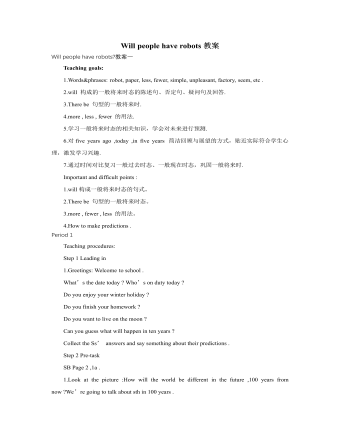
人教版新目标初中英语八年级下册Will people have robots教案
Teaching goals:1.Words&phrases: robot, paper, less, fewer, simple, unpleasant, factory, seem, etc .2.will 构成的一般将来时态的陈述句、否定句、疑问句及回答.3.There be 句型的一般将来时.4.more , less , fewer 的用法.5.学习一般将来时态的相关知识,学会对未来进行预测.6.对five years ago ,today ,in five years 简洁回顾与展望的方式,贴近实际符合学生心理,激发学习兴趣.7.通过时间对比复习一般过去时态、一般现在时态,巩固一般将来时.Important and difficult points :1.will构成一般将来时态的句式。2.There be 句型的一般将来时态。3.more , fewer , less 的用法。4.How to make predictions .Period 1Teaching procedures:Step 1 Leading in1.Greetings: Welcome to school .What’s the date today ? Who’s on duty today ?Do you enjoy your winter holiday ?Do you finish your homework ?Do you want to live on the moon ?Can you guess what will happen in ten years ?Collect the Ss’ answers and say something about their predictions .Step 2 Pre-taskSB Page 2 ,1a .1.Look at the picture :How will the world be different in the future ,100 years from now ?We’re going to talk about sth in 100 years .
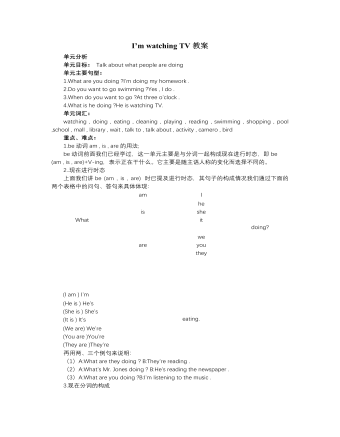
人教版新目标初中英语七年级下册I’m watching TV教案
单元分析单元目标: Talk about what people are doing 单元主要句型:1.What are you doing ?I’m doing my homework .2.Do you want to go swimming ?Yes , I do .3.When do you want to go ?At three o’clock .4.What is he doing ?He is watching TV. 单元词汇:watching , doing , eating , cleaning , playing , reading , swimming , shopping , pool ,school , mall , library , wait , talk to , talk about , activity , camero , bird 重点、难点:1.be动词am , is , are的用法;be动词前面我们已经学过,这一单元主要是与分词一起构成现在进行时态,即be (am , is , are)+V-ing,表示正在干什么。它主要是随主语人称的变化而选择不同的。2..现在进行时态上面我们讲be (am , is , are) 时已提及进行时态,其句子的构成情况我们通过下面的两个表格中的问句、答句来具体体现:3.现在分词的构成现在进行时态中be + V - ing 的构成中V-ing被称为现在分词,它的基本构成是动词原形+ing,但也有些特殊情况,下面分几类说明:(1)一般情况+ing如:read→reading,go→going,do→doing,look→looking,listen→listening,watch→watching.(2)以不发音的e结尾的词,去掉e,再加ing.如:write→writing,skate→skating,type→typing,wake→waking,make→making
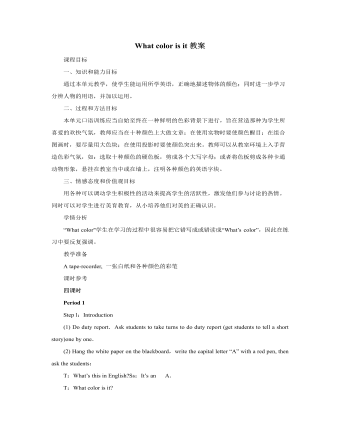
人教版新目标初中英语七年级上册What color is it教案
一、知识和能力目标通过本单元教学,使学生能运用所学英语,正确地描述物体的颜色;同时进一步学习分辨人物的用语,并加以运用。二、过程和方法目标本单元口语训练应当自始至终在一种鲜明的色彩背景下进行,旨在营造那种为学生所喜爱的欢快气氛,教师应当在十种颜色上大做文章;在使用实物时要使颜色醒目;在组合图画时,要尽量用大色块;在使用投影时要使颜色突出来。教师可以从教室环境上入手营造色彩气氛,如:选取十种颜色的硬色板,剪成各个大写字母;或者将色板剪成各种卡通动物形象,悬挂在教室当中或在墙上,注明各种颜色的英语字块。三、情感态度和价值观目标用各种可以调动学生积极性的活动来提高学生的活跃性,激发他们参与讨论的热情。同时可以对学生进行美育教育,从小培养他们对美的正确认识。
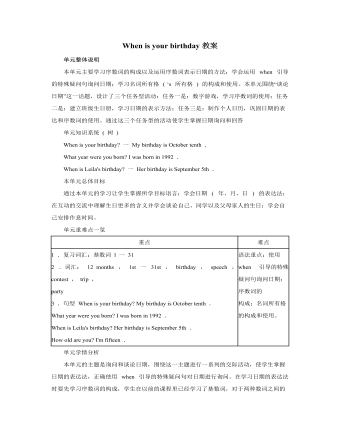
人教版新目标初中英语七年级上册When is your birthday教案
本单元主要学习名词所有格 ('s 所有格 ) 的构成和使用。在初次接触 “ 名词所有格 ” 时,学生较难理解的可能是 “ 所有格 ” 这个名称,对于它的构成,学生也许会觉得较容易。教师可通俗地告诉学生 “ 所有格 ” 的意思是表示 “…… 的 ” ,这样学生反而容易接受。在使用 “ 名词所有格 ” 形式时,学生容易犯错误或混淆的主要是:将这种一 's 构成形式与 is 的缩写形式混淆,如: My father's name's Jin Zhi .,可以这样告诉学生:名词所有格的后面一般应接名词;勿将这种一 's 结构盲目套用与人称代词上,代替物主代词使用,如 He's father's name is Li Cheng 。在教学初期,可不讲授名词所有格的其它形式,待时机成熟,再向学生介绍复数名词所有格形式的结构一 ' ,如: the students' bikes 。 Self Check 教学内容 Self Check( 教材 P52) 教学目标 知识与能力 复习词汇 birthday , date , month , January , February , March , April , May , June , July , August , September , October , November , December , date , birth , age , old , speech . contest . trip , party , event , an , festival , pop , concert , chorus , lecture , music ;引导学生复习、巩固“询问和谈论日期”的目标语言并运用所学知识安排活动。
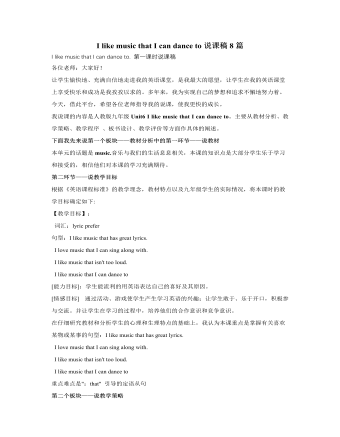
人教版新目标初中英语九年级上册I like music that I can dance to说课稿8篇
2、 难点结合功能句进行听力练习。确定目标的根据新课程标准规定,通过听、说、读、写的训练,使学生获得英语基础知识和初步运用英语进行交际的能力,激发学生的学习兴趣,为进一步的学习打基础。此外,根据我国国情及新课程标准的要求,现阶段英语教学的素质主要包括思想素质教育,潜在英语能力的培养,非智力因素的培养等几个方面。而我们班的学生本身英语基础不太好,部分学生已经对英语失去了信心,还有一部分学生觉得英语越来越难,渐渐力不从心了,不感兴趣了,上课注意力也不集中了。针对这种情况,备课时要增加趣味性,以此来提高学生对英语的学习兴趣。二、教法学法1、 教法:采取“任务型”教学法。教师根据本节课内容,安排合适的任务,让学生在完成任务的过程中达到本节课所拟定的目标。
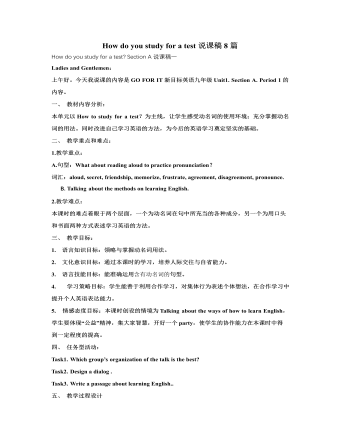
人教版新目标初中英语九年级上册How do you study for a test说课稿8篇
教学反思:这是学生升入初三的第一节课,学生学习热情很高,通过这一课时的学习,学生掌握了语言目标中所要求的知识重点、难点和语言技能,如by dong, practicing doing ,too……to,现在完成时态,动名词短语做主语及提建议的几种方式,但是有部分学生由于基础较差,还需要从培养学生学习兴趣入手,真正实现教育面向全体学生。在教学中采取的具体办法由:个别辅导,互助学习,留不同层次夫人作业,争取让每一位学生都吃饱而不掉队。How do you study for a test?Two periodsSection BGoals●To listen about learning English●To talk about learning English●To read about learning EnglishProceduresWarming up by reading to the recordingHello, everyone. To begin with, let’s listen and read to the recording of the text HOW DO YOU LEARN BEST? That is, read aloud to the tape, as fast as the tape goes, as clearly as the native reader reads. OK? Here we go!My cat speaks English. Sometimes my cat comes to me and tells me that she is hungry. Or that her leg hurts. How does my cat tell me these things? I don't speak pussy-cat language.1a Reading and checkingLearning English can be both easy and difficult. What things are easy for you? And what things are difficult for you? Now turn to page 5, read the list on the top and check √the statements that are true for you.1b Making a listYou have read and checked the statements true for you. Now think and make a list of other things difficult for you, too.
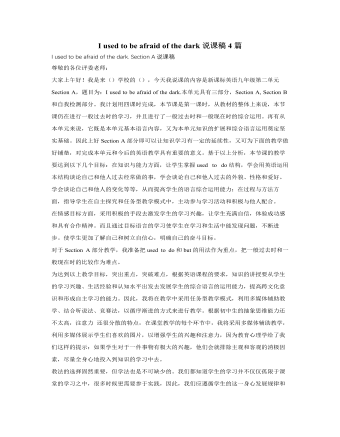
人教版新目标初中英语九年级上册I used to be afraid of the dark说课稿4篇
2、说说写写通过读写训练,进一步学会用 used to 结构来表达自己和同伴过去害怕,或现在仍旧害怕的事情,并且要把最后的结果书写下来,然后让他们将结果用英语告之其他同学,为学生创造展示才能的机会。这样能使全体同学都积极参与,集中精力认真听。既巩固了本节课的目标语言,又为下一个环节3b的对话打下基础。活动结问题比较容易,英语基础较差的学生也能够独立完成,因此,在检查答案是尽量让这部分学生回答,使他们体验到成功后的喜悦,提高他们学习英语的兴趣。 3.对话练习:让学生两人一组,模仿3a中的对话,根据提供的信息与提示词进行对话练习,目的在于对新学的目标语言进行口头练习与设定情景中的运用。为学生创造展示才能的机会。推荐两至三组的同学到教室前面,就所编的对话进行角色表演。
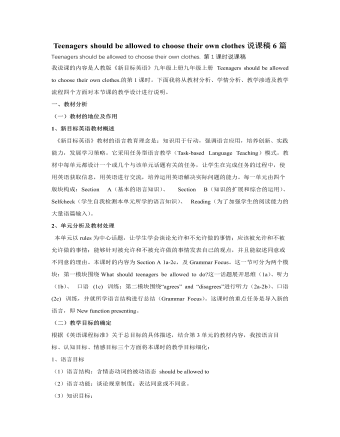
人教版新目标初中英语九年级上册Teenagers should be allowed to choose their own clothes说课稿6篇
二、教材分析本课时主要是以听和说的方式来谈论一些家庭和学校的“规矩和制度”,知道那些时可以做的,那些是不可以做的,让学生先从口头上了解这些规矩和制度,为后面的学习做好准备。三、教学的目的和要求1. 掌握短语be strict with sb.的用法,并介绍be strict in sth.的用法;2. 学生能够根据所学的知识,了解用什么方式/句型来制定规章制度。3. 多听,提高学生的习愿望,敦促学生开口说英语,用本课所学的知识来表达自己的意见。四、教学重点和难点1. 如何正确使用be allowed to do…这一句型(在不同时态中的被动语态运用)。2. 如何获得听力技巧及口语技能的提高。五、教学过程T—teacher S—studentS s—students Bb—blackboardStep 1 Warming up Check their homework first, and see if the Ss can make sentences by using the rules in 4, Section A. If possible, try to give some help.
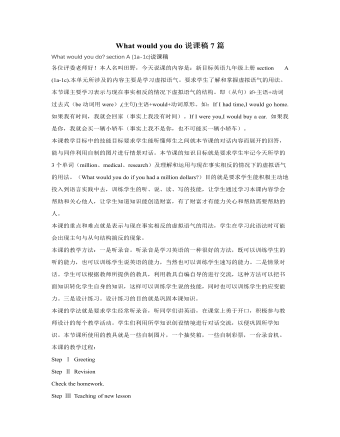
人教版新目标初中英语九年级上册What would you do说课稿7篇
Get students to complete the activity in groups of four. As the groups work together, move around the room to make sure students discuss the topic in English and know how to fill in the chart.Check the answers by asking different pairs of students to say their conversations to the class.Answers will vary.Optional activityAsk, What would you do if there were no classes tomorrow? Ask students to write as many answers as they can. Then get students to work in pairs. One ask the other the question and see how many new answers the other is able to think of.Step Ⅴ SummarySay, In this class, we've done a lot of reading, speaking and writing practice using the target language.Step Ⅵ Homework(1) Review the target language by reading the conversations in Activity 3a.(2) Finish off the exercises on pages 11~12 of the workbook.Step Ⅶ Blackboard DesignWhat would you do?Section AThe Third PeriodTarget language:A: I can't sleep the night before an exam. Then I'm too tired to do well. What should I do?B: If I were you, I'd take a long walk before going to bed. That should help you relax.A: I really want a dog, but my parents won't let me have one.B: Well, dogs can be a lot of trouble. Maybe you should get a small pet, like a goldfish.A: That's a good idea.
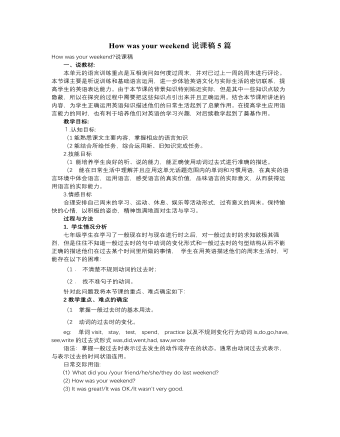
人教版新目标初中英语七年级下册How was your weekend说课稿5篇
(一)说教材与教情从本单元的题目How was your weekend?就可以知道本单元的语言目标是讨论曾经的活动或过去发生的事件,要求学生掌握的语法知识就是一般过去时。一般过去时这一时态在Go for it!这套书里这是第一次出现,因此要让学生把一贯以来他们所熟悉的一般现在时暂时搁浅,而用新学的一般过去时来表述发生的事件,无非是本单元的重点也是本单元的难点所在。要攻克这一重难点的关键,我认为在于能使学生对动词的过去时具备一定的熟巧度,并且这种熟巧度不仅应该表现在听说能力上,也应该体现在阅读和写作能力当中;不仅要在听和读的语言输入过程当中能够对这一时态有较强的敏感度,也要在说和写的语言输出过程中能够比较自然和自如地运用这一时态。对一般过去时在语言中运用的这种熟巧度实际上也就是本单元预期达到的语言技能目标。在本单元整体的知识和技能的大目标下,本课时作为本单元的第三课时,也就是本单元最后一个课时,它所覆盖的课本内容是Section B中的听力、阅读和写作。
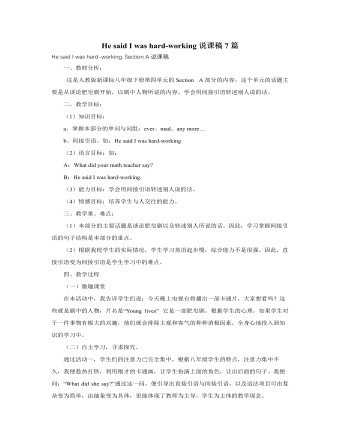
人教版新目标初中英语八年级下册He said I was hard-working说课稿7篇
三、教学重、难点:(1)本部分的主要话题是谈论肥皂剧以及转述别人所说的话。因此,学习掌握间接引语的句子结构是本部分的重点。(2)根据我校学生的实际情况,学生学习英语起步慢,综合能力不是很强。因此,直接引语变为间接引语是学生学习中的难点。四、教学过程(一)激趣课堂在本活动中,我告诉学生们说:今天晚上电视台将播出一部卡通片,大家想看吗?这些就是剧中的人物,片名是“Young lives” 它是一部肥皂剧。根据学生的心理,如果学生对于一件事物有极大的兴趣,他们就会排除主观和客气的种种消极因素,全身心地投入到知识的学习中。(二)自主学习,寻求探究。通过活动一,学生们的注意力已完全集中,根据八年级学生的特点,注意力集中不久,我便趁热打铁,利用刚才的卡通画,让学生扮演上面的角色,让出后面的句子。我便问:“What did she say?”通过这一问,便引导出直接引语与间接引语,以及语法项目可由复杂变为简单,由抽象变为具体,更能体现了教师为主导,学生为主体的教学现念。
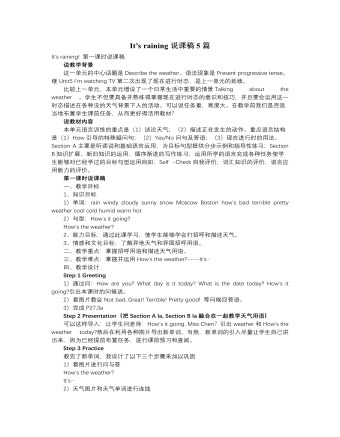
人教版新目标初中英语七年级下册It’s raining说课稿5篇
学会谈论天气情况的好坏 A B C DHow引导的特殊疑问句的用法 A B C D综合评估 A B C DA. 很好 B.较好 C.一般 D.需努力姓名 学号 评估项目及内容 评估情况单词和词组学习和运用情况 A B C D语法掌握情况——现在进行时用法及构成 A B C D学会介绍天气情况,描述天气 A B C D学会谈论天气情况的好坏 A B C DHow引导的特殊疑问句的用法 A B C D综合评估 A B C DA. 很好 B.较好 C.一般 D.需努力附表(三)学生自我检查评价表Unit6日期:姓名 班级 学号 自 我 检 查 评 价1、我会读、能听懂下列的单词和词组: 1、我还不会读、不能听懂下列的单词和词组:2、我已掌握了下列的单词、词组(习惯用语) 2、我暂时未掌握下列的单词、词组(习惯用语)和句型3、能在实际情景中运用上述的单词、词组(习惯用语)和句型 3、未能在实际情景中运用上述的单词、词组(习惯用语)和句型我准备来改善提高我的学习效率。初中七年级(下)新目标(英语)单元检测题一、听力(Listening Test)满分为20分